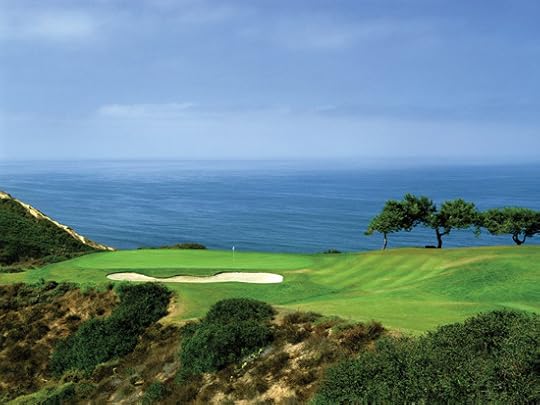What Happens When You Decide to Care
Most golf courses around the world have some things in common: they are usually built on hundreds of acres of beautiful land with hills, trees, water, sand, manicured lawns, people with disposable incomes, and a pro shop for last-minute supplies. What do they look like when they are turned into refugee camps?
I recently played at Torrey Pines golf course in La Jolla, California, the site of several major golf tournaments. Every famous golfer has played there. It looks over the Pacific Ocean, and every TV angle includes views of the water in the background and hang gliders launching right next to one of the fairways. It’s one of the most beautiful golf courses in the country.
 Torrey Pines – La Jolla, California
Torrey Pines – La Jolla, California
I wasn’t playing in a tournament there. I’m not really very good at golf. But I was with the poet Billy Collins and his friend Brian Doyle Murray (Caddyshack, anyone?), and they wanted to play there. So we did, and I lost five bucks to each of them. It was time and money well spent. And no, I didn’t quote any movie lines, despite my son’s constant texting of things to say to Murray.
A few days later I was in Port Au Prince, Haiti, to do some reporting about that country’s recovery from its devastating earthquake in 2010. More than 200,000 people died in that quake and the aftershocks. Millions were displaced because the sub-standard housing they were in collapsed. About 60,000 found their way to the Petionville golf course, which is located in a La Jolla-esque part of Port Au Prince. Because it had acres of wide open spaces, and no buildings that could fall on people, it was an ideal setting for the newly homeless. They set up tarps, blankets and shacks. Eventually Sean Penn helped provide latrines and clean water stations, and solar phone recharging poles. Three years later there are still about 20,000 living there. I walked through that tent city, talked to residents, and tried to picture what it looked like as a golf course.
Then I thought about Torrey Pines and wondered what it would look like as a tent city filled with refugees. I thought about how the Superdome in New Orleans was turned into a refugee camp after Hurricane Katrina. I remembered how quickly the thin veneer of civilization could be peeled away when people become desperate.
Then I thought about my own pampered life. Is there room for the refugee in my little personal country club? Is there room for desperate people who have no where else to go?
• • •
Last night I was leaving a meeting in downtown San Diego around 8:30. It was cold and rainy. I walked a couple of blocks to my car, parked on the street. Two homeless men were sitting on the curb, leaning against my car.
“Evening, gentlemen,” I said.
They figured out that this was my car.
“We’re not hurting your car or anything,” one of them said. “We’re just staying out of the wind.”
They got up.
For some reason, I said this to them:
“I wasn’t worried about my car, and I’m not afraid of you. Are you warm enough?”
“We’re really cold,” one of them said.
I opened my trunk and pulled out a hooded sweatshirt and a blanket.
“You guys will have to figure out who gets what,” I said.
They thanked me and walked off in the rain.
For that moment, at least, the private country club was open. But it’s time to re-stock the pro shop. Not enough blankets.
What Happens When You Decide to Care is a post from: Storyline Blog
Donald Miller's Blog
- Donald Miller's profile
- 2745 followers



